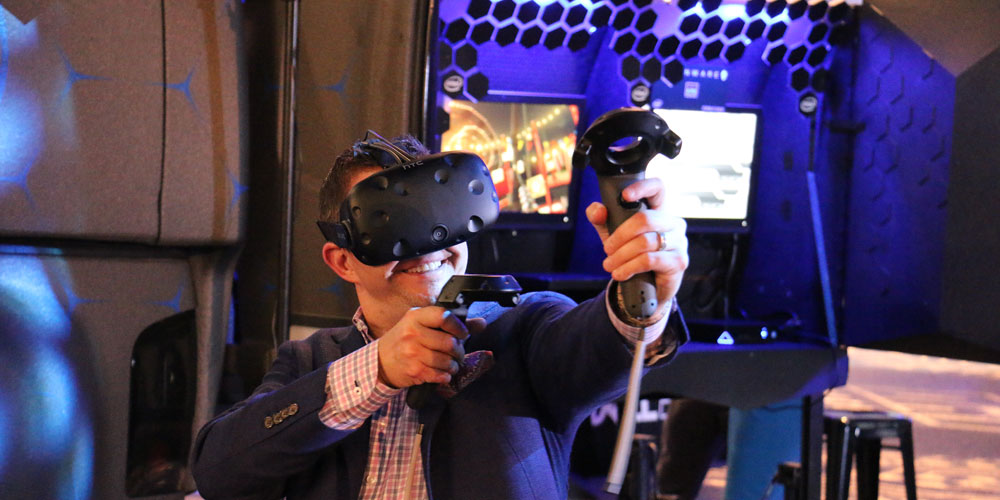May is Small Business Month. Dell is celebrating Small Business month with a 4-part small business series discussing hot trends in small business. Stay tuned for next week’s piece.

Virtual reality is having a GIGANTIC impact on our world right now. If you are in the tech industry like I am, scarcely a day passes when we do not hear the words “virtual reality.”
The history of virtual reality is long dating back to as early as 1838. But the advent of virtual reality is usually attributed to 1987 when Jaron Lanier coined the term. His company, VPL, was the first to sell VR goggles, called the “Eyephone 1” and “Eyephone HRX.” You read that right. Eyephone.
Thirty years later and VR is no longer confined to Mr. Lanier’s lab. It is everywhere!
Whole businesses are being built around VR. 30 Ninjas, a digital entertainment company that creates 360 degree VR content, deployed Dell Precision Workstations 7910 to shoot four jobs live on the Conan O’Brien show – running three major creative workflows through the machine without any breakdowns or crashes.
https://www.youtube.com/watch?v=8gNPzMmICd0
In its early years, VR focused mainly on video games and entertainment but its usefulness now extends to the military, medical procedures, aviation and business.
As with any new technology, small businesses are often late adopters due to high cost and uncertainty involved with a new innovation. What we’re seeing now is the VR industry eclipse that peak of being a “new innovation” and entering into a more mature phase of its life.
Small businesses are now adopting virtual reality faster than ever, often driven to do so by the very characteristic that kept them from being an early adopter of VR: minimal capital.
VR as a money-saver, you say? Surely that cannot be. But it is. Here are five ways small businesses are adopting virtual reality:
- Architecture and Design
The application of modeling is a signature in the worlds of design and architecture. Architects and designers can now allow their clients to walk through proposed designs even before the first bricks are placed.
Small design shops, whether for buildings, fashion and more, will give their clients the opportunity to “try before they buy” in a way that’s never been possible.
This will make a particularly large difference for small operations that don’t have the resources to draw or build models, or preliminary designs for a wide array of customers. They might spend months on a model or plan for a pitch and ultimately not win the business. Virtual reality will be a cost reducer for these types of industries.
- Prototyping
Prototyping has always been a costly procedure as one part production is far more expensive than serial production. Specifically, this has consistently been a drawback for small business owners with limited amount of capital for prototype production. Virtual reality will allow small- and large-sized prototypes to be developed in order to be checked before serial production starts – providing a major advantage to small business owners who are willing to incorporate VR for business applications.
- Low cost training
Military training has already begun using virtual reality head gears. Small business owners will also be able to use VR for business purposes. It will be a two pronged usage where the owner can use the VR equipment in order to train his/her own staff rather than spending money on props and training aids. The second methodology is training people, such as in driving and cleaning training, which will reduce the cost as fuel and cleaning material will no longer be required.
- Shopping
Online shopping has been around for a good 20 years now. The experience will be elevated to virtual aisles where the shopper can select items online. This will enable small online business owners to create virtual storefronts for the client to visit and enjoy shopping.
- Dating
Dating websites have traditionally used pictures and chats to allow people to interact. VR will revolutionize the business as users will be able to now have intriguing experiences in different environments to get to know each other.
Another Dell for Small Business customer, 3D Live, is using VR to raise awareness about saving our planet!
Partnering with the Lonely Whale Foundation, 3DL Live leveraged Dell Precision and Alienware technology to create, “Cry Out: The Lonely Whale Experience,” an underwater VR expedition to allow viewers to witness the impact of pollution on today’s waters. Using AMD-powered Alienware Area 51 desktops and Dell Precision 7910 workstations, 3D Live was able to build an experience unlike any other – enabling users to swim with whales and truly gain an understanding of the crisis.
https://www.youtube.com/watch?v=lhXOFKP8S8U
Are you convinced yet that you should consider VR for your small business? During Small Business month, we celebrate small businesses and the innovations they are putting forward to quite literally change the entire world.
One thing is clear: “Virtual Reality”, an idea once confined to an unknown Jetsons-esque future, is now a reality and it is here to stay, to make the world a better place, and to enable small and large businesses to operate like never before.
